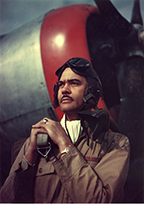
Black History 365
By Ramon Robinson
Benjamin O. Davis Jr. is a name that stands out in American military history. He was a trailblazer who played a significant role in the fight for equality within the U.S. military. Davis went from being a student at West Point to a commanding position in the United States Air Force, marking a profound shift in the military’s racial landscape.
Benjamin Oliver Davis Jr. was born in Washington, D.C. on December 18, 1912. He was born into a family with a strong military background, as his father, Benjamin O. Davis Sr., had already made history as the first African American general in the U.S. Army. Growing up, Davis Jr. was exposed to an environment that instilled a deep sense of duty and a commitment to breaking down racial barriers.
Davis faced a significant challenge upon entering the United States Military Academy at West Point in 1932, despite his familial legacy. Racial segregation was not only pervasive in society but also deeply entrenched in the military. Being one of only two black cadets, he faced isolation, ostracism, and open hostility from his peers. However, he persevered through these adversities, determined to prove himself and make a lasting impact.
Davis’s time at West Point was a crucible that forged his character and resolve. Enduring four years of isolation, he graduated in 1936 as the academy’s only black graduate. His achievements at West Point laid the groundwork for a career that would not only break racial barriers but also redefine the role of African Americans in the U.S. military.
Commissioned as a second lieutenant, Davis’s early military career was marked by various assignments that showcased his leadership capabilities. However, it was during World War II that he would truly leave an indelible mark on history. In 1941, he assumed command of the 99th Pursuit Squadron, the first all-black air unit in the U.S. military. This squadron would later become part of the famed Tuskegee Airmen.
The Tuskegee Airmen, named after the Tuskegee Army Airfield in Alabama, were a group of African American pilots and support personnel who defied both gravity and societal norms. Davis’s leadership was instrumental in the success of the Tuskegee Airmen, who, despite facing skepticism and prejudice, became one of the most effective fighter groups in World War II.
Under Davis’s command, the Tuskegee Airmen not only showcased their aerial prowess but also demonstrated the fallacy of racial stereotypes. Their remarkable combat record, coupled with Davis’s leadership, played a pivotal role in dismantling the military’s segregation policies. The Tuskegee Airmen, through their skill and dedication, helped pave the way for the eventual desegregation of the U.S. armed forces in 1948.
Davis’s accomplishments extended beyond the battlefield. His post-war career was marked by a series of historic firsts. In 1947, he became the first African American officer to achieve the rank of brigadier general in the U.S. Air Force. His promotion was not merely a personal achievement but a landmark moment in the struggle for racial equality.
As a general, Davis faced the daunting task of dismantling institutional discrimination within the Air Force. He sought to create a more inclusive and meritocratic environment, emphasizing the importance of evaluating individuals based on their abilities rather than their race. Davis’s leadership philosophy centered on excellence, and he worked tirelessly to create opportunities for African Americans in the military.
In 1954, Benjamin O. Davis Jr. became the commander of the 13th Air Force, making him the first African American to lead an integrated military unit. His appointment was a testament to his unwavering commitment to breaking down racial barriers and promoting diversity within the military ranks. Davis, leadership during a critical period in American history set the stage for future advancements in civil rights and equality.
Apart from his military career, Davis continued to be a trailblazer who played a key role in shaping national defense policies. He contributed to the development of the Department of Defense and served as an influential voice in strategic planning. His impact on the military and broader American society extended far beyond the confines of his illustrious career.
Benjamin O. Davis Jr.’s legacy endures as a symbol of resilience, courage, and the triumph of the human spirit over adversity. His pioneering efforts not only elevated the status of African Americans in the military but also paved the way for subsequent generations to pursue careers in service to their country, regardless of race or background. As we reflect on the storied history of the U.S. Air Force, the name Benjamin O. Davis Jr. stands as a beacon of inspiration, reminding us that true leadership knows no color or boundaries.
https://youtube.com/shorts/VJI6ObHk5FM?feature=share



Be the first to comment